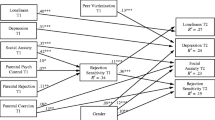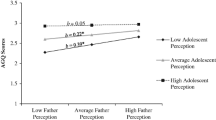Abstract
Parent-child interactions and parenting behavior may be related to social aggression among adolescents, and adolescents’ social aggression may relate to parents’ social aggression. This study investigated (a) whether parent psychological control predicted future adolescent and parent social aggression in their own peer relationships, (b) whether parents’ social aggression was related to their use of psychological control within the parent-adolescent relationship (c) whether adolescents’ and parents’ social aggression was associated with changes in each other’s social aggression over time, and (d) change in psychological control. Participants were 174 racially/ethnically diverse parent-adolescent dyads assessed longitudinally for four years. Adolescents were approximately 15-years-old at the first time point. The adolescent sample was 52% girls and 56% identified as White, 22% as Black or African American, 16% as Hispanic, and 5% as mixed race/ethnicity. Ten percent of the parent participants were fathers. Parents self-reported their psychological control and social aggression, and their adolescents’ teachers reported adolescents’ social aggression. Hypotheses were tested using longitudinal structural equation modeling and a latent growth curve analysis. The hypothesized effect of parent’s psychological control on parent’s future aggression with their own peers was supported. Psychological control positively predicted parent aggression from T2 to T3 (β = .28, p< .05) and from T3 to T4 (β = .37, p < .05). Other hypotheses were not supported. The findings suggest that the parent-child relationship may influence the parent’s functioning in their own peer relationships. Parents’ peer relations seem to have important implications for their own wellbeing and the parent-child relationship.

Similar content being viewed by others
References
Albrecht, A. K., Galambos, N. L., & Jansson, S. M. (2007). Adolescents’ internalizing and aggressive behaviors and perceptions of parents’ psychological control: a panel study examining direction of effects. Journal of Youth and Adolescence, 36, 673–684. https://doi.org/10.1007/s10964-007-9191-5.
Archer, J., & Coyne, S. M. (2005). An integrated review of indirect, relational, and social aggression. Personality and Social Psychology Review, 9, 212–230. https://doi.org/10.1207/s15327957pspr0903_2.
Bandura, A. (1973). Aggression: a social learning analysis. Oxford, England: Prentice Hall.
Bandura, A. (1978). Social learning theory of aggression. Journal of Communication, 28, 12–29. https://doi.org/10.1111/j.1460-2466.1978.tb01621.x.
Barber, B. K. (1996). Parental psychological control: revisiting a neglected construct. Child Development, 67, 3296–3319. https://doi.org/10.1111/j.1467-8624.1996.tb01915.x.
Barber, B. K., Bean, R. L., & Erickson, L. D. (2002). Expanding the study and understanding of psychological control. In B. K. Barber (Ed.), Intrusive parenting: How psychological control affects children and adolescents. Washington, DC: American Psychological Association Press.
Barber, B. K., Stolz, H. E., Olsen, J. A., Collins, W. A., & Burchinal, M. (2005). Parental support, psychological control, and behavioral control: assessing relevance across time, culture, and method. Monographs of the Society for Research in Child Development, 70, 1–137. https://doi.org/10.1111/j.1540-5834.2005.00365.x.
Bronfenbrenner, U. (1986). Ecology of the family as a context for human development: research perspectives. Developmental Psychology, 22, 723–742. https://doi.org/10.1037/0012-1649.22.6.723.
Card, N. A., Stucky, B. D., Gita, M. S., & Little, T. D. (2008). Direct and indirect aggression during childhood and adolescence: a meta-analytic review of gender differences, intercorrelations, and relations to maladjustment. Child Development, 79, 1185–1229. https://doi.org/10.1111/j.1467-8624.2008.01184.x.
Casper, D. M., Meter, D. J., & Card, N. A. (2015). Addressing measurement issues related to bullying involvement. School Psychology Review, 44, 353–371. https://doi.org/10.17105/spr-15-0036.1.
Crick, N. R. (1996). The role of overt aggression, relational aggression, and pro behavior in the prediction of children’s future social adjustment. Child Development, 67, 2317–2327. https://doi.org/10.1111/1467-8624.ep9706060169.
Côté, S. M., Vaillancourt, T., Barker, E. D., Nagin, D., & Tremblay, R. E. (2007). The joint development of physical and indirect aggression: predictors of continuity and change during childhood. Development and Psychopathology, 19, 37–55. https://doi.org/10.1017/S0954579407070034.
Dodge, K. A., Greenberg, M. T., Malone, P. S. & Conduct Problems Prevention Research Group. (2008). Testing an idealized Dynamic Cascade Model of the development of serious violence in adolescence. Child Development, 79, 1907–1927. https://doi.org/10.1111/j.1467-8624.2008.01233.x.
Ehrenreich, S. E., Beron, K. J., Brinkley, D. Y., & Underwood, M. K. (2014). Family predictors of continuity and change in social and physical aggression from ages 9 to 18. Aggressive Behavior, 40, 421–439. https://doi.org/10.1002/ab.21535.
Ehrenreich, S. E., Beron, K. J., & Underwood, M. K. (2016). Social and physical aggression trajectories from middle childhood through late adolescence as predictors of maladjustment at age 18: rule-breaking behaviors, internalizing symptoms, and borderline and narcissistic features. Developmental Psychology, 52, 457–462. https://doi.org/10.1037/dev0000094.
Espelage, D. L., & Swearer, S. M. (2010). A social-ecological model for bullying prevention and intervention. In S. R. Jimerson, S. M. Swearer & D. L. Espelage (Eds), Handbook of bullying in schools: an international perspective (pp. 61–72). New York, NY: Routledge.
Forrest, S., Eatough, V., & Shevlin, M. (2005). Measuring adult indirect aggression: the development and psychometric assessment of the indirect aggression scales. Aggressive Behavior, 31, 84–97. https://doi.org/10.1002/ab.20074.
Hart, C. H., Nelson, D. A., Robinson, C. C., Olsen, S. F., & McNeilly-Choque, M. K. (1998). Overt and relational aggression in Russian nursery-school-age children: parenting style and marital linkages. Developmental Psychology, 34, 687 https://doi.org/10.1037/0012-1649.34.4.687.
Jia, F., Moore, E. W. G., Kinai, R., Crowe, K. S., Schoemann, A. M., & Little, T. D. (2014). Planned missing data designs with small sample sizes: How small is too small? International Journal of Behavioral Development, 38, 435–452. https://doi.org/10.1177/0165025414531095.
Kawabata, Y., Alink, L. R., Tseng, W. L., Van Ijzendoorn, M. H., & Crick, N. R. (2011). Maternal and paternal parenting styles associated with relational aggression in children and adolescents: a conceptual analysis and meta-analytic review. Developmental Review, 31, 240–278. https://doi.org/10.1016/j.dr.2011.08.001.
Kuppens, S., Grietens, H., Onghena, P., & Michiels, D. (2009). Relations between parental psychological control and childhood relational aggression: Reciprocal in nature? Journal of Clinical Child & Adolescent Psychology, 38, 117–131. https://doi.org/10.1080/15374410802575354.
Kuppens, S., Laurent, L., Heyvaert, M., & Onghena, P. (2013). Associations between parental psychological control and relational aggression in children and adolescents: a multilevel and sequential meta-analysis. Developmental Psychology, 49, 1697–1712. https://doi.org/10.1037/a0030740.
Lau, K. S., Marsee, M. A., Lapré, G. E., & Halmos, M. B. (2016). Does parental relational aggression interact with parental psychological control in the prediction of youth relational aggression? Deviant Behavior, 37, 1–13. https://doi.org/10.1080/01639625.2016.1156981.
Larson, R. W., & Richards, M. H. (1994). Family emotions: Do young adolescents and their parents experience the same states? Journal of Research on Adolescence, 4, 567–583. https://doi.org/10.1207/s15327795jra0404_8.
Laursen, B., & Collins, W. A. (2009). Parent-child relationships during adolescence. In R. M. Lerner & L. Steinberg (Eds.), Handbook of adolescent psychology (pp. 2–42). New York, NY: Wiley & Sons. https://doi.org/10.1002/9780470479193.adlpsy002002.
Little, T. D., Cunningham, W. A., Shahar, G., & Widaman, K. F. (2002). To parcel or not to parcel: exploring the question, weighing the merits. Structural Equation Modeling: A Multidisciplinary Journal, 9, 151–173. https://doi.org/10.1207/S15328007SEM0902.
Little, T. D. (2013). Longitudinal structural equation modeling. New York, NY: Guilford.
Loukas, A., Paulos, S. K., & Robinson, S. (2005). Early adolescent social and overt aggression: examining the roles of social anxiety and maternal psychological control. Journal of Youth and Adolescence, 34, 335–345. https://doi.org/10.1007/s10964-005-5757-2.
Michiels, D., Grietens, H., Onghena, P., & Kuppens, S. (2008). Parent-child interactions and relational aggression in peer relationships. Developmental Review, 28, 522–540. https://doi.org/10.1016/j.dr.2008.08.002.
Nelson, D. A., & Crick, N. R. (2002). Parental psychological control: Implications for childhood physical and relational aggression. In B. K. Barber (Ed.), Intrusive parenting: How psychological control affects children and adolescents (pp. 161–189). Washington, DC, USA: American Psychological Association. https://doi.org/10.1037/10422-006.
Nelson, D. A., Hart, C. H., Yang, C., Olsen, J. A., & Jin, S. (2006). Aversive parenting in China: associations with child physical and relational aggression. Child Development, 77, 554–572. https://doi.org/10.1111/j.1467-8624.2006.00890.x.
R Core Team (2015). R: a language and environment for statistical computing. R Foundation for Statistical Computing, Vienna, Austria. https://www.R-project.org/
Reed, T. J., Goldstein, S. E., Morris, A. S., & Keyes, A. W. (2008). Relational aggression in mothers and children: links with psychological control and child adjustment. Sex Roles, 59, 39–48. https://doi.org/10.1007/s11199-008-9423-5.
Reid, J. B., & Patterson, G. R. (1989). The development of antisocial behaviour patterns in childhood and adolescence. European Journal of Personality, 3, 107–119. https://doi.org/10.1002/per.2410030205.
Rosseel, Y. (2012). lavaan: an R package for structural equation modeling. Journal of Statistical Software, 48, 1–36. http://www.jstatsoft.org/v48/i02/.
semTools Contributors (2015). semTools: Useful tools for structural equation modeling. R package version 0.4-9. https://cran.r-project.org/web/packages/semTools/citation.html
Shuster, M. M., Li, Y., & Shi, J. (2012). Maternal cultural values and parenting practices: longitudinal associations with Chinese adolescents’ aggression. Journal of Adolescence, 35, 345–355. https://doi.org/10.1016/j.adolescence.2011.08.006.
Snyder, J. J., & Patterson, G. R. (1995). Individual differences in aggression: a test of a reinforcement model of socialization in the natural environment. Behavior Therapy, 26, 371–391. https://doi.org/10.1016/S0005-7894(05)80111-X.
Soenens, B., Vansteenkiste, M., Goossens, L., Duriez, B., & Niemiec, C. P. (2008). The intervening role of relational aggression between psychological control and friendship quality. Development, 17, 661–681. https://doi.org/10.1111/j.1467-9507.2007.00454.x.
Steinberg, L., & Silverberg, S. B. (1986). The vicissitudes of autonomy in early adolescence. Child Development, 57, 841–851.
Underwood, M. K., Rosen, L. H., More, D., Ehrenreich, S. E., & Gentsch, J. K. (2012). The BlackBerry project: capturing the content of adolescents’ text messaging. Developmental Psychology, 48, 295–302. https://doi.org/10.1037/a0025914.
Walker, S., Richardson, D. S., & Green, L. R. (2000). Aggression among older adults: the relationship of interaction networks and gender role to direct and indirect responses. Aggressive Behavior, 26, 145–154. https://doi.org/10.1002/(SICI)1098-2337(2000)26:2<145::AID-AB1>3.0.CO;2-Q.
Werner, N. E., & Crick, N. R. (1999). Relational aggression and social-psychological adjustment in a college sample. Journal of Abnormal Psychology, 108, 615–623. https://doi.org/10.1037/0021-843x.108.4.61.
Acknowledgements
We gratefully acknowledge the support of the children and families who participated in this research, an outstanding local school system that wishes to be unnamed, a talented team of undergraduate research assistants, and NIH grants R01 MH63076, K02 MH073616, R56 MH63076, and R01 HD060995. The content is solely the responsibility of the authors and does not necessarily represent the official views of the National Institutes of Health.
Author Contributions
DJM conducted the analyses and wrote the majority of the paper. SEE: collected the data and wrote portions of the introduction, methods, and discussion sections. MKU: was the principal investigator on all grants supporting this project, developed the project, collected the data, and collaborated on the writing and editing of the final manuscript.
Funding
This study was funded by National Institutes of Health grants R01 MH63076, K02 MH073616, R56 MH63076, and R01 HD060995. The content is solely the responsibility of the authors and does not necessarily represent the official views of the NIH.
Author information
Authors and Affiliations
Corresponding author
Ethics declarations
Conflict of Interest
The authors declare that they have no conflict of interest.
Ethical Approval
All procedures performed in studies involving human participants were in accordance with the ethical standards of the University of Texas at Dallas Institutional Review Board and with the 1964 Helsinki declaration and its later amendments or comparable ethical standards.
Informed Consent
Informed consent was obtained from all individual participants included in the study.
Rights and permissions
About this article
Cite this article
Meter, D.J., Ehrenreich, S.E. & Underwood, M.K. Relations between Parent Psychological Control and Parent and Adolescent Social Aggression. J Child Fam Stud 28, 140–151 (2019). https://doi.org/10.1007/s10826-018-1240-z
Published:
Issue Date:
DOI: https://doi.org/10.1007/s10826-018-1240-z




